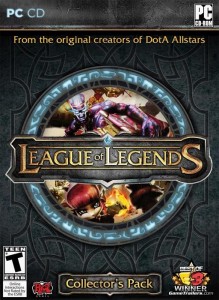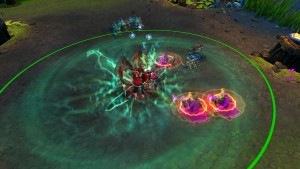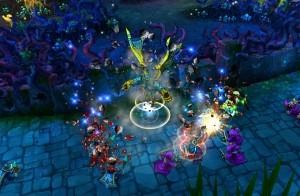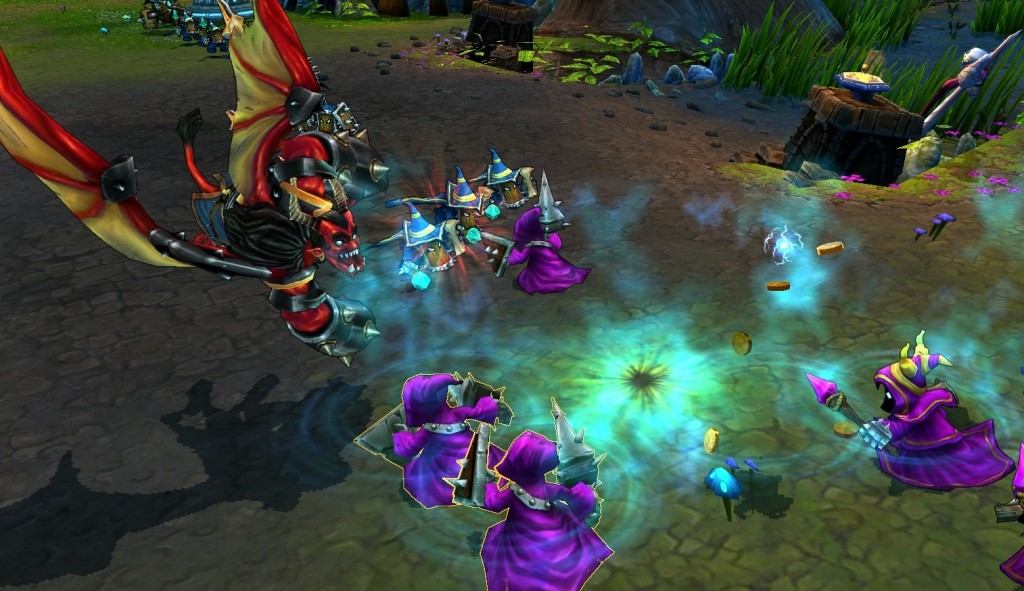It Takes a Village…Tribunal: League of Legends’ Community
 “Why do I play this game?” I groan and rub my temples with my fingers.
“Why do I play this game?” I groan and rub my temples with my fingers.
“That’s what we ask you every day, Cass,” my friend replies wearily through Ventrilo.
Chances are, if you follow professional gaming or free-to-play games, you’ve heard of League of Legends. The free-to-play MOBA (Multiplayer Online Battle Arena) is a veritable powerhouse among online games right now. Riot Games takes their product very seriously; it is clearly a labor of love at its heart. It’s possible that the care and upkeep of the game is what attracts the millions of players; maybe it’s the pool of one hundred champions to choose from, each with unique abilities and skills; it could be the white hot tournament circuit which boasts a prize pool of five million dollars and a hundred thousand viewers. Whatever the reason, there’s no denying that League of Legends is a significant game: Riot Games’s massive success is a classic David and Goliath tale; the tournaments are home to some of the most entertaining personalities in professional gaming; and the staff do their best to interact with the community. Riot Games’ efforts have made them a champion of community moderation, and more importantly, public perception of their image and brand.
Despite its many strengths, League of Legends has a massive flaw: its community. I’ve coaxed countless friends into the game. Most of those friends abandoned the game as quickly as they picked it up, and there’s one consistent thread in all of their complaints: the people who actually play the game. Those who stick with the game complain about burn out, anger problems, lack of empathy from other players, unwillingness to try new tactics or champions, or the unfairness of the rating system. Granted, there is no game on Earth that people won’t gripe about, but the sheer vitriol and rage that regular League players can develop can be shocking. Every once in a while my friends and I will have a repetition of the conversation which always starts with a pained “Why do I play this game?” and sometimes I can’t find a good answer to that question.
Riot has a serious problem. They have a product that is extremely taxing and confusing for casual players and a playerbase which actively deters new players. There are one hundred champions, with separate roles and archetypes who fulfill certain tasks well. In order to be truly comfortable with the game, you must have a good idea of what each champion can do.
Don’t let Nasus farm all game, he’ll become a monster. If they pick Karthus, grab Soraka. Always ban Shen. Vayne has a weak early game, but she’s a hyper carry. Pantheon and LeBlanc are beasts early game but fall off with scaling. And so on and so on.) Don’t forget the ways characters synergize (or in some cases, counter each other)! You want a ranged AD bottom, unless it’s a kill lane like Jarvan and Leona. Send an AP mid, but if they have Kassadin an AD caster can counter him. Galio, Nunu and Amumu on the same team is hilariously cheesy. Janna, Tristana or Lee Sin can move enemies to safety, so be careful how you use their ultimates!
 If all of the above writing sounds like gobbledygook to you, then Riot has a problem.
If all of the above writing sounds like gobbledygook to you, then Riot has a problem.
Riot has tried very hard to make their game easy for new players, and has succeeded to a great degree. There’s a spectator mode that allows you to watch featured games so you can pick up tricks from the pros. Denying (the ability to stop an enemy from getting gold and experience) is gone. Complicated champions like Invoker (the infamous mage with 36 ability combinations) are gone. As opposed to other games like Valve’s DOTA 2 (the sequel to the wildly popular Warcraft 3 mod Defense of the Ancients, which is often credited with being the father of the MOBA genre) or Heroes of Newerth, your champion will scale up, making the game less item dependent. Watching a game of League of Legends is clear and easy compared to its competitor Heroes of Newarth and yet the game is still ridiculously complicated. Players who have mastered Starcraft 2 or DOTA may find it a joke, but the casual player will be quickly overwhelmed.
All of the above would not be an issue if the community was accepting, helpful and kind. I once found myself in a ranked game with a player trying out a new champion. I wrote in team chat, “Hey Warwick, it’d be useful to get X and Y item instead of Z, because of these reasons. Just a note for future games! :)”. The entire team commented at length at how insanely rare it was to find a kind criticism. I have played three thousand games (1500+ hours) of League of Legends and I’ve seen the worst of the worst: death threats, racial slurs, taunting a player who had to leave a game due to the death of his father, a slew of foul language and insults for the crime of making a small mistake, speculation on another players’ sexuality and whether they had driven their parents to divorce, and a threat to “kick your ass until it isn’t an ass anymore”, which just brings up the question of what it would become. All of this was witnessed before I had hit the maximum level and entered rank games – before there was anything actually on the line.
Riot, to its credit, has worked hard to stamp out this problem. This Christmas, players who had never been punished for in-game conduct received a boon of Riot Points (in-game money). One year ago, they launched the Tribunal. The Tribunal is a novel system; players who have been reported for harassment, negative attitude, intentionally ruining a game or insulting other players are put up on trial. The jury is the community – anyone level 20 or higher can cast a vote. The players choose who to pardon and who to punish (although there is Riot oversight). Riot has released the numbers on how many Tribunal cases are punished and how many banned players have reformed (over 50% change their behaviours for the better), which are quite promising for the experiment’s success.
 The Tribunal is also notable for two things: one, Riot saves money and time in moderation costs while keeping efficiency; and secondly, the Tribunal achieves the crucial tasks of vindicating good players. Many players tell trolls that they will be reported, and a common rebuttal is “nothing will happen, I don’t care.” The Tribunal challenges this idea. Players feel as though their reports are not worthless, and that they are in fact bettering the community.
The Tribunal is also notable for two things: one, Riot saves money and time in moderation costs while keeping efficiency; and secondly, the Tribunal achieves the crucial tasks of vindicating good players. Many players tell trolls that they will be reported, and a common rebuttal is “nothing will happen, I don’t care.” The Tribunal challenges this idea. Players feel as though their reports are not worthless, and that they are in fact bettering the community.
The Tribunal establishes an important point behind Riot’s stance on dealing with their community: Riot trusts their players. They honestly believe that the problematic community is the result of a few bad apples and that the silent majority of their playerbase are quiet, civil, and if not polite then acceptable. Community Manager Steve “Pendragon” Mercer takes this principle a step further; when a troll directly appealed his ban to the man in charge, Pendragon set up a public poll with the game logs as evidence with the troll’s account in the balance in what was essentially a public execution. This is why Riot has kept the Tribunal running, this is why they are so active in the community, this is why they put on the show of making a bet with a troll with the forum community as judge and this is also a big reason as to why so many players keep flocking to Riot despite the barriers. Riot Games had the choice to walk away from the toxic community that so many of their competitors shrug over. Instead, they are making a solid effort to reform it.
Only time will tell whether Riot’s gamble is right, but I intend to stay a loyal customer – despite the fact that I’m still not sure why I play this game.
About This Post
